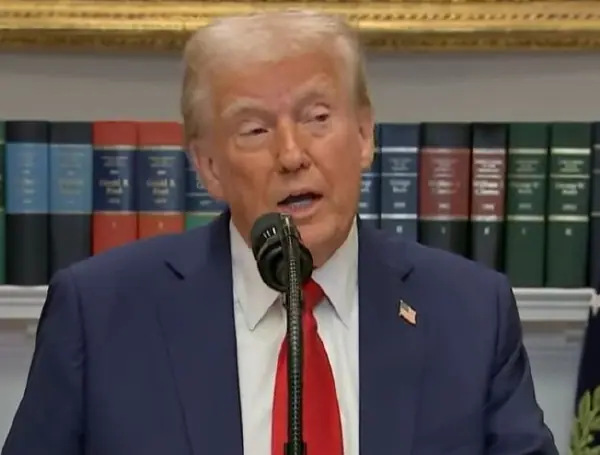A federal judge in Massachusetts has temporarily blocked a key component of the Trump administration’s recent immigration policy changes, issuing an emergency order that prevents the Department of Homeland Security (DHS) from prematurely terminating the parole status of hundreds of thousands of individuals from Cuba, Haiti, Nicaragua, and Venezuela (CHNV).
The ruling, issued late Monday by U.S. District Judge Indira Talwani, grants a temporary stay against a DHS policy announced on March 25, 2025. That policy sought to end, effective April 24, 2025, the previously granted parole and associated work authorizations for all individuals admitted under the CHNV parole programs, regardless of their original parole expiration dates.
READ: Major Universities Sue Department Of Energy Over “Devastating” Cut To Research Funding
The lawsuit, filed by individuals identified by pseudonyms such as Svitlana Doe, named President Donald J. Trump and top officials at DHS, including Secretary Kristi Noem, Acting ICE Director Todd M. Lyons, Acting CBP Commissioner Pete R. Flores, and Acting USCIS Director Kika Scott, as defendants.
The CHNV parole programs were initiated in late 2022 and early 2023, allowing nationals from the four countries, with U.S.-based financial sponsors, to apply for advance authorization to travel to the U.S. and seek temporary parole, typically for two years. The programs aimed to provide a lawful pathway and discourage irregular migration.
However, following President Trump’s executive orders signed on January 20, 2025, which directed the termination of “categorical parole programs,” DHS moved to end the CHNV initiatives. In a March 25 Federal Register Notice, DHS announced the immediate termination of the programs for new applicants and declared that parole for those already in the U.S. under CHNV would end en masse on April 24, 2025, unless an individual determination was made otherwise.
READ: Liberty Justice Center Urges Supreme Court To Hear Mississippi Christian Free Speech Case
DHS argued the programs no longer served a significant public benefit, were inconsistent with foreign policy, and that early termination was necessary to facilitate expedited removal proceedings before parolees could accrue two years of physical presence in the U.S.
Judge Talwani found that the plaintiffs, representing a potential class of affected parolees, were likely to succeed in arguing that the DHS decision was unlawful. The court identified several key issues:
- Legal Error on Expedited Removal: The judge concluded that DHS’s primary rationale for the early, 30-day termination — preventing parolees from reaching a two-year presence threshold to avoid expedited removal — was likely based on a misunderstanding of the law. The court reasoned that individuals lawfully paroled into the U.S. are generally not subject to expedited removal under the cited statute, regardless of their length of stay.
- Failure to Conduct Case-by-Case Review: The court found that the Immigration and Nationality Act requires parole decisions, including terminations, to be made on a “case-by-case basis.” Judge Talwani determined that the statute seems to contemplate individual assessments of whether the “purposes of such parole” have been served for each person, rather than a blanket termination affecting hundreds of thousands without individual review.
- Inadequate Consideration of Reliance Interests: While DHS acknowledged that parolees had built lives, secured jobs, and established community ties based on their authorized stay, the court found its justification for overriding these reliance interests with an early termination was insufficient and based on the likely flawed expedited removal argument. The court noted DHS failed to adequately explain why the original humanitarian concerns justifying the programs no longer warranted allowing parolees to remain for their initially granted periods.
- Arbitrary and Capricious: Given the legal errors and lack of individualized assessment, the court found the plaintiffs were likely to prove DHS’s decision to truncate existing parole grants was arbitrary and capricious under the Administrative Procedure Act (APA).
READ: CNN Legal Analyst Tells Panelist Deported El Salvador Man Isn’t ‘Coming Back
The plaintiffs include individuals who fled political persecution, violence, and economic collapse in their home countries. Declarations filed with the court detailed how they secured jobs, supported families in the U.S. and abroad, enrolled children in school, and pursued asylum claims, relying on the stability provided by their two-year parole grants. They expressed fear of returning to dangerous conditions or being rendered stateless.
Judge Talwani’s order specifically stays the March 25 Federal Register Notice “insofar as it revokes, without case-by-case review, the previously granted parole and work authorization issued to noncitizens paroled into the United States pursuant to [CHNV] parole programs prior to the noncitizen’s originally stated parole end date.” Any individualized notices sent based on this policy are also stayed.
The court is also considering certifying an “Early Revocation Parolee Class” to cover all affected individuals.
The government had requested that the judge stay her own order pending an appeal, but Judge Talwani denied that request, stating the government had not shown a likelihood of success or irreparable harm, while a stay would allow the premature termination of parole for hundreds of thousands.
The ruling means that, for now, CHNV parolees whose status was set to expire on April 24 will retain their lawful status and work authorization until their original parole end dates, pending further developments in the case. DHS retains the authority to terminate parole on an individual, case-by-case basis if it determines the purpose of that specific grant has been served.
Please make a small donation to the Tampa Free Press to help sustain independent journalism. Your contribution enables us to continue delivering high-quality, local, and national news coverage.
Connect with us: Follow the Tampa Free Press on Facebook and Twitter for breaking news and updates.
Sign up: Subscribe to our free newsletter for a curated selection of top stories delivered straight to your inbox.
